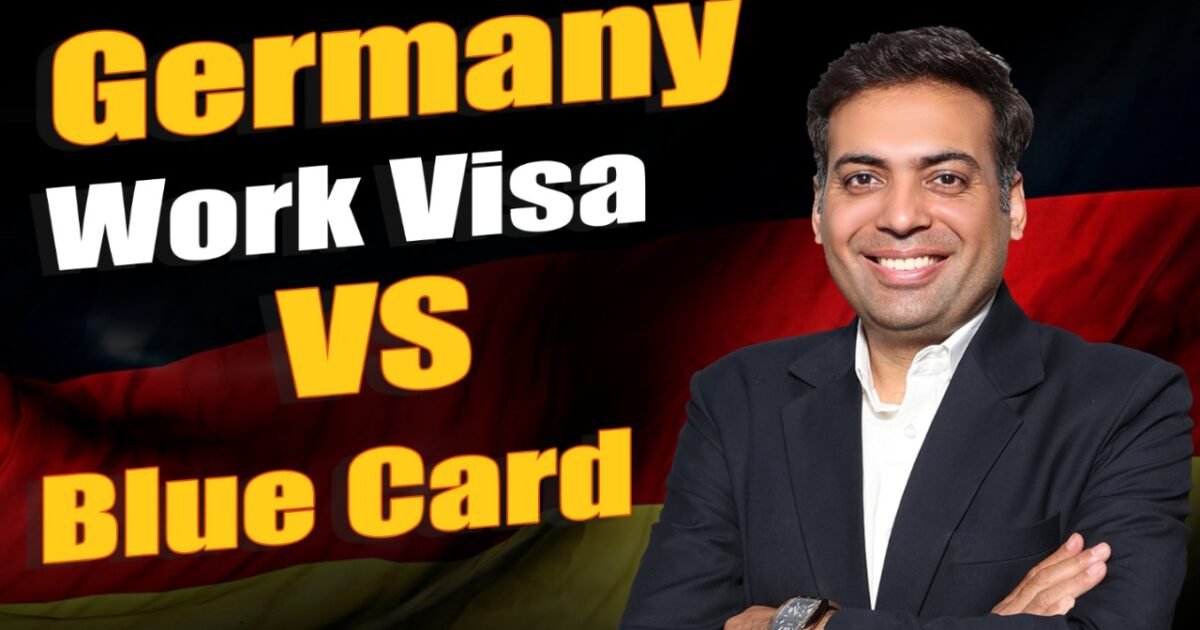Table of Contents
ToggleGermany Work Visa vs. Blue Card: What’s the Difference?

Germany Work Visa vs. Blue Card: What’s the Difference? – Germany has emerged as one of the top destinations for skilled professionals seeking lucrative career opportunities in Europe. With a robust economy, high quality of life, and a shortage of skilled workers across various sectors, Germany actively encourages foreign talent to contribute to its workforce. But when it comes to working legally in Germany, many applicants find themselves confused between two major options: the Germany Work Visa and the EU Blue Card.
Although both permits allow non-EU nationals to work and live in Germany, there are significant differences in their eligibility requirements, benefits, and long-term residency options.
In this blog, we at Globexa Immigration break down the key differences between the Germany Work Visa and the EU Blue Card to help you make an informed decision.
1. What is a Germany Work Visa?
The Germany Work Visa is a general category visa that allows non-EU/EEA nationals to work in Germany if they have a job offer from a German employer.
Key Features:
Eligibility: Open to skilled workers in a wide range of occupations, including healthcare, engineering, IT, education, and more.
Job Offer Required: Yes, you must have a concrete job offer from a German employer.
Qualifications: Recognition of foreign qualifications may be required, especially for regulated professions.
Processing Time: Typically 1 to 3 months.
Residence Permit: Issued as a residence permit for employment under §18a or §18b of the German Residence Act.
Minimum Salary: No fixed minimum salary, but the job must be in line with the German labor market standards.
2. What is the EU Blue Card?
The EU Blue Card is a residence permit designed for highly qualified non-EU citizens. It aims to attract top-tier talent to the EU and offers enhanced benefits compared to standard work visas.
Key Features:
Eligibility: Designed for highly skilled professionals, particularly in fields like IT, engineering, natural sciences, and mathematics.
Job Offer Required: Yes, you need a binding job offer or an employment contract.
Educational Qualifications: A recognized university degree is a must.
Minimum Salary Threshold (2025 figures):
General occupations: €45,300 annually.
Shortage occupations (STEM, doctors, etc.): €41,041.80 annually.
Fast-Track Permanent Residency: Eligible for a settlement permit after 33 months (or 21 months if you meet German language proficiency at B1 level).
Mobility Within EU: After 18 months, you can move to another EU country under specific conditions.
3. Application & Documentation Checklist
Documents for Both Visas Typically Include:
Valid passport
Completed visa application form
Recent biometric photos
Signed employment contract or binding job offer
Proof of qualifications (degree certificates, diplomas)
Curriculum Vitae (CV)
Proof of health insurance coverage
Proof of accommodation in Germany
Proof of financial means (sometimes required)
Police clearance certificate (in some cases)
Visa fee payment receipt
Additional for Blue Card:
Recognition of foreign university degree (via Anabin or ZAB)
Salary confirmation documents
4. How Long Does the Process Take?
Germany Work Visa: Usually 1-3 months depending on embassy workload and document readiness.
EU Blue Card: Often processed within 1-2 months due to streamlined procedures.
Tip: Early preparation of documents and embassy appointments can shorten wait times.
5. Salary Thresholds & Impact
The salary threshold ensures Blue Card holders are contributing at a highly skilled level. The thresholds are updated annually and differ for shortage occupations to encourage talent in critical sectors.
Why salary matters:
Meeting the threshold grants faster residency.
Salaries below thresholds mean applying for the standard work visa.
Salaries significantly higher than the threshold increase your chances of approval.
6. Job Mobility and Career Growth
With Germany Work Visa:
You can change jobs, but the new employment must be approved by the Foreigners’ Office.
Mobility within the EU is limited.
With EU Blue Card:
After 2 years, you can change jobs without prior approval.
After 18 months, you can move to another EU member state for work.
This flexibility enhances career options and international exposure.
7. Family Reunification
Work Visa: Family members can join, but spouse work rights may be limited initially.
Blue Card: Faster family reunification with unrestricted work rights for spouses.
8. Special Considerations for Certain Professions
Healthcare: Doctors and nurses are in high demand; special fast-track procedures apply.
IT Professionals: Blue Card salary thresholds often apply, but exemptions exist for younger workers or graduates.
Trades: Vocational qualifications accepted under Work Visa; Blue Card usually not applicable.
Researchers & Academics: EU Blue Card or dedicated research visas available.
9. Common Challenges & How to Overcome Them
Qualification Recognition Delays: Start early with recognition process (ZAB).
Language Barrier: Begin learning German immediately; integration courses help.
Salary Negotiations: Know the minimum thresholds and negotiate accordingly.
Documentation Gaps: Use professional assistance to avoid incomplete or incorrect paperwork.
10. How Globexa Immigration Supports You
Profile Evaluation: Determine your best visa route.
Job Search Assistance: Connect with German employers and recruiters.
Qualification Recognition Guidance: Streamline degree validation.
Document Preparation: Ensure all paperwork meets embassy standards.
Interview Preparation: Mock interviews and tips to boost confidence.
Post-Arrival Support: Help with registration, residence permits, and family reunification.


